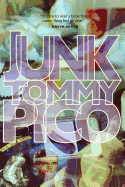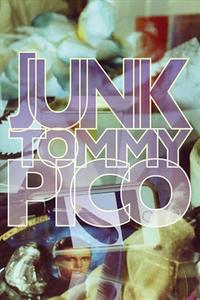
 If future aliens find Tommy Pico's book-length poem Junk among the ruins of human civilization, they might understand what it was like being alive in the year 2018, on the cusp of major cultural and ecological change.
If future aliens find Tommy Pico's book-length poem Junk among the ruins of human civilization, they might understand what it was like being alive in the year 2018, on the cusp of major cultural and ecological change.
Pico (Nature Poem) doesn't so much distill the times as incarnate them in verse, breathlessly. Seventy-two pages of free-flowing couplets comprise the third in the poet's Teebs trilogy. Ostensibly about a romantic breakup, Junk, as the name would suggest, teems with ephemera: junk food, junk clothes, junk feelings. The poet--often referred to as the alter-ego Teebs--swims through this post-industrial, consumer-oriented inheritance with a stream-of-consciousness style that recalls the generation-defining mythos of Allen Ginsberg's Howl. The poem opens in "the multiplex Temple of/ Canoodling and Junk food," with the poet's anxiety and sexuality likened to "a snipe hunt Love in the time of/ climate change."
Unlike Howl, though, Junk is funny. Instead of romanticizing tragically hip beatnik bros, Pico turns to pop culture icons for inspiration. "My safe/ word is Go to hell Katy Perry," the poet declaims. He revels in the dregs of pop culture as much as in junk food. Between tributes to Janet Jackson and hankerings for spicy Fritos, he philosophizes on the nature of his theme: "Junk as insulation from the cold/ shoulder of people Junk as a/ way of being at the center of yr own universe."
It's the frivolity of Junk that makes its more serious themes and undertones all the more striking. Playful amusement yields to self-loathing and alienation. The poet is Native American--Pico hails from the Kumeyaay Nation of Southern California--and queer. Past struggles on the Indian reservation intrude on racy literary life in New York City. The consumerist urban world outside the reservation is a dizzying, erasing force, driven by white supremacy, heteronormativity and planet-warming fossil fuels. Mired in marginalization, the poet wonders, "How can 'happiness' be anything more than a metaphor for privilege?"
The genius of Junk lies in the poet's outward vision, in his ability, heeding "the gusting forward of time," to create new space for himself and others like him, to create a new sense of identity. Toward the end of the book, the poet self-deprecatingly proclaims, "this is a poem of vibrant inconsequence." The irony, of course, is that it's not. Heady, heartfelt and unforgettable, Junk stands out as the work of an original and vital voice. --Scott Neuffer, writer, poet, editor of trampset
Shelf Talker: Native American poet Tommy Pico indulges modern American consumer culture in this fun yet profound book-length poem.

